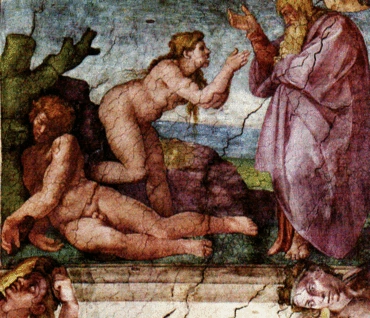1
Хитрјйшій изъ всјхъ звјрей полевыхъ, которыхъ Іегова Богъ создалъ, былъ змјй. Онъ сказалъ женј: подлинно ли скізалъ Богъ: не јшьте плодовъ ни съ какого дерева въ саду?
2
Жена сказала змјю: мы јдимъ плоды съ деревъ въ саду.
3
Только плодовъ съ дерева, которое посреди сада, сказалъ Богъ, не вкушайте, и не прнкасайтесь къ нему чтобы не умереть.
4
И сказалъ змјй женј: не умрете;
5
но знаетъ Богъ, что въ день, въ который вы вкусите плода его, откроются глаза ваши, и вы будете, какъ Боги, знающіе добро и зло.
6
Женј показалось, что это дерево хорошо для пищи, и что оно пріятно для очей, и что прекрасно это дерево, потому что даетъ знаніе: и она взяла плодъ его, и јла; также дала мужу своему, и онъ јлъ.
7
Тогда у нихъ обоихъ открылись глаза, и они увидјли, что наги, и сшили смоковныя листья, и сдјлали себј опоясанія.
8
И услышали гласъ Іеговы Бога ходящаго въ саду во время прохлады дня, и скрылся человјкъ и жена его отъ лица Іеговы Бога между деревьями сада.
9
И воззвалъ Іегова Богъ къ человјку и сказалъ ему: гдј ты?
10
Онъ сказалъ: я услышалъ гласъ Твой въ саду и убоялся, потому что я нагъ, и скрылся.
11
А Онъ сказалъ: кто тебј сказалъ, что ты нагъ? развј ты вкусилъ отъ древа, отъ котораго Я запретилъ тебј вкушать?
12
И сказалъ человјкъ: жена, которую Ты мнј далъ, она дала мнј плодъ съ этого дерева, и я јлъ.
13
И сказалъ Іегова Богъ женј: что ты это сдјлала? и сказала жена: змјй обольстилъ меня, и я јла.
14
Тогда Іегова Богъ сказалъ змјю: за то, что ты это сдјлалъ, проклятъ ты предъ всјми скотами и предъ всјми звјрями полевыми Ты будешь ходить на чревј твоемъ, и будешь јсть прахъ во всј дни жизни твоей.
15
И вражду положу между тобою и между женою, и между сјменемъ твоимъ и между сјменемъ ея; оно будетъ поражать тебя въ голову, а ты будешь жалить его въ пяту.
16
Женј сказалъ: скорбь на скорбь наведу Я тебј въ беременности твоей; съ болјзнію будешь рождать дјтей; и къ мужу твоему влеченіе твое, и онъ будетъ господствовать надъ тобою.
17
И человјку сказалъ: за то, что ты послушалъ словъ жены твоей, и јлъ съ древа, о которомъ Я заповјдалъ тебј говоря: не вкушай отъ него, - проклята земля за тебя; съ скорбію будешь питаться отъ нея во всј дни жизни твоей.
18
Тернъ и волчецъ произраститъ она тебј; и ты будешь питаться полевою травою.
19
Въ потј лица своего будешь јсть хлјбъ, пока не возвратишься въ землю, поелику ты изъ нея взятъ; ибо ты персть, и въ персть возвратишься.
20
И нарекъ человјкъ женј своей имя: Ева, ибо сдјлалась матерью всјхъ живущихъ.
21
И сдјлалъ Іегова Богъ человјку и женј его одежды кожаныя и одјлъ ихъ.
22
И сказалъ Іегова Богъ: вотъ, человјкъ сталъ, какъ одинъ изъ Насъ, зная добро и зло; теперь, чтобы не простеръ руки своей, и не взялъ плода съ древа жизни, и не вкусилъ его, и не сталъ жить во вјкъ.
23
И выслалъ его Іегова Богъ изъ сада Едемскаго воздјлывать землю, изъ которой онъ взятъ.
24
И когда изгналъ человјка, тогда на востокъ у сада Едемскаго поставилъ Херувимовъ и пламенный, обращающійся мечъ, чтобы охранять путь къ древу жизни.







